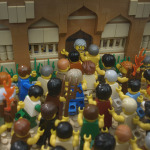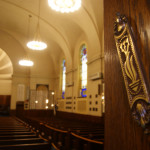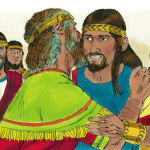Congregation Beth Mordecai
Congregation Beth Mordecai
An inclusive congregation affiliated with the Conservative Movement.
Your Jewish Home for the Soul!
An inclusive congregation affiliated with the Conservative Movement.
Your Jewish Home for the Soul!
January 16, 2015 By bethmordecai no comments.
Parashat Va-era 2015/5775 (Triennial II): Egyptian Magicians and The Finger of God In the second third of this week's Torah portion (Exodus 7:8-8:15), we read of four instances in which Moses and Aaron demonstrate the power of God -- through turning a rod into a snake (Exodus 7:8-10), changing the water of the Nile to blood (Exodus 7:17-21), spreading frogs throughout the land (Exodus 7:27-8:2), and creating lice from the dust of the earth (Exodus 8:12-13). In the first three instances, Egyptians magicians (hartumei mitzrayim) are able to replicate the miracles that Moses and Aaron demonstrate (Exodus 7:11-12; 22; 8:3). However, when they fail to replicate the fourth miracle/plague (i.e. the lice) they proclaim to Pharaoh that "this is the finger[...]
Category : Online Learning Online Parashah Class Tag : online learning online parashah class weekly torah portion
By bethmordecai no comments.
 2015/5775 Parashat Sh'mot (Triennial II) -- And The Bush Was Not Consumed
In this week's parashah, we encounter the famous moment in which Moses meets God by way of a "bush all aflame, yet the bush was not consumed" (Exodus 3:2). This symbol of the burning bush was adopted by Solomon Schechter, the first great chancellor of the Jewish Theological Seminary (JTS), to be the symbol of the institution known as the scholarly fountainhead of Conservative Judaism. For today's class, we will use the insights of JTS rabbis (and the commentaries they bring) to understand the value of this symbol today.
Please join us or watch at your convenience!
Classes from other[...]
2015/5775 Parashat Sh'mot (Triennial II) -- And The Bush Was Not Consumed
In this week's parashah, we encounter the famous moment in which Moses meets God by way of a "bush all aflame, yet the bush was not consumed" (Exodus 3:2). This symbol of the burning bush was adopted by Solomon Schechter, the first great chancellor of the Jewish Theological Seminary (JTS), to be the symbol of the institution known as the scholarly fountainhead of Conservative Judaism. For today's class, we will use the insights of JTS rabbis (and the commentaries they bring) to understand the value of this symbol today.
Please join us or watch at your convenience!
Classes from other[...]
Category : Online Learning Online Parashah Class Tag : bush conservative judaism consumed exodus JTS online learning online parashah class sh'mot solomon schechter weekly torah portion
December 19, 2014 By bethmordecai no comments.
Parashat Mikeitz 2014/5775 (Triennial II) -- Hope Amidst Destruction In this week's Torah portion we learn about the stories related to the rationing ("shever") of grain in Egypt by our forefather Joseph. The Hebrew word "shever" is used often in this context, principally to refer to the dividing of grains into rations. Yet in other contexts the same root (sh-v-r) means "to destroy" and an analogous root (s-v-r) means "to hope." What can we learn by the different meanings of the same root? Given the dire circumstances caused by the famine in Egypt, is it possible that the act of "rationing" is a reflection of hope amidst destruction? And if so, what role can God play in helping us have hope through the tribulations[...]
Category : Online Learning Online Parashah Class Tag : brothers destruction hope joseph mikeitz miketz online learning online parashah class parsha parshah weekly torah portion מקץ
November 7, 2014 By bethmordecai no comments.
 Parashat Vayera 2014/5775 (Triennial II) -- Raping Foreigners
In this week's Parashah, we read how the men of Sodom came to Lot's home to demand that he release the men staying in his home so "v'neid-ah otam, so that they can rape them (Genesis 19:5). This trope of raping foreigners is echoed later in the Bible in Judges 19:22. Why are the men in both of these stories doing this to the foreigners in their midst? What can these stories teach us about the power of rape and attitudes to foreigners? Do these stories have anything to teach us today?
Classes from other years:
Parshat Vayera[...]
Parashat Vayera 2014/5775 (Triennial II) -- Raping Foreigners
In this week's Parashah, we read how the men of Sodom came to Lot's home to demand that he release the men staying in his home so "v'neid-ah otam, so that they can rape them (Genesis 19:5). This trope of raping foreigners is echoed later in the Bible in Judges 19:22. Why are the men in both of these stories doing this to the foreigners in their midst? What can these stories teach us about the power of rape and attitudes to foreigners? Do these stories have anything to teach us today?
Classes from other years:
Parshat Vayera[...]
Category : home Online Learning Online Parashah Class Tag : foreigners Genesis 19:5 home Judges 19:22 land online learning online parashah class power ramban rape sanhedrin sanhedrin 109a strangers talmud vayera weekly torah portion וירא
November 6, 2014 By bethmordecai no comments.
Parashat Lekh L'kha 2014/5775 (Triennial II): God Has to Show Up (The Covenant Between the Pieces) In this week's parashah, we learn of the "covenant between the pieces" in which "a smoking oven" and "flaming torch" appear between divided pieces of sacrifices made by Abraham (Genesis 15:17). In the imaginations of the rabbis this is a representation of God as if to say that God appears before Abraham (in his dream) to make a covenant with him. What is unique about this appearance of God? What can it teach us about how God is supposed to appear in our lives and the nature of our relationship with God? Classes from other years: Online Learning Online Parashah Class Tag : covenant God land online parashah class promise relationship weekly torah portion
October 24, 2014 By bethmordecai no comments.
 Parashat Noah Triennial II (2014/5775) -- God's Heart
In this week's Torah portion, God uses a flood to destroy all living beings except for Noah and all of the creatures stowed safely in his ark. Afterwards God resolves to never again destroy humanity through a flood, but God's decision only comes about after "God spoke to God's heart" (Genesis 8:21). Is it possible for God to physically have a heart? If so (or even if it's a metaphor) what is significant about God speaking to God's heart and can it teach human beings something about our own hearts?
Join us for this fascinating class as we learn about God's heart and the gift of our[...]
Parashat Noah Triennial II (2014/5775) -- God's Heart
In this week's Torah portion, God uses a flood to destroy all living beings except for Noah and all of the creatures stowed safely in his ark. Afterwards God resolves to never again destroy humanity through a flood, but God's decision only comes about after "God spoke to God's heart" (Genesis 8:21). Is it possible for God to physically have a heart? If so (or even if it's a metaphor) what is significant about God speaking to God's heart and can it teach human beings something about our own hearts?
Join us for this fascinating class as we learn about God's heart and the gift of our[...]
Category : Online Learning Online Parashah Class Tag : acceptance destruction God God's love endures forever heart humanity Noah online learning online parashah class physical rainbow sacrifices נח
September 19, 2014 By bethmordecai no comments.
 Parashat Nitzavim/Vayelekh 2014/5774 (Triennial I) -- Stranger Danger
In this week's Torah portion, Moses tells the Israelites that "you stand this day, all of you, before the LORD your God...even the stranger within the camp, from woodchopper to water drawer" (Deuteronomy 29:9-10). The Hebrew text does not intimate a separation between the "strangers" and the "Israelites," but the rabbinic commentator Panim Yafot (18th Century, Poland & Germany) points to how even in this text the strangers the Israelites must be wary of strangers. As we approach the High Holidays and open our communities to all people who seek Jewish wisdom, how does this text help us (and how does it NOT help us) understand how to welcome strangers into our communities?
Join us[...]
Parashat Nitzavim/Vayelekh 2014/5774 (Triennial I) -- Stranger Danger
In this week's Torah portion, Moses tells the Israelites that "you stand this day, all of you, before the LORD your God...even the stranger within the camp, from woodchopper to water drawer" (Deuteronomy 29:9-10). The Hebrew text does not intimate a separation between the "strangers" and the "Israelites," but the rabbinic commentator Panim Yafot (18th Century, Poland & Germany) points to how even in this text the strangers the Israelites must be wary of strangers. As we approach the High Holidays and open our communities to all people who seek Jewish wisdom, how does this text help us (and how does it NOT help us) understand how to welcome strangers into our communities?
Join us[...]
Category : home Online Learning Online Parashah Class Tag : Deuteronomy 29:10-11 high holidays nitzavim online learning online parashah class panim yafot strangers welcoming גרים נצבים פנים יפות
September 12, 2014 By bethmordecai no comments.
 Parashat Ki Tavo 2014/5774 (Triennial I) -- Having a Positive Outlook
In this week's Torah portion, the Israelites ask God to look upon them positively: "Look down (hashkifah) from Your holy abode, from heaven, and bless Your people Israel" (Deuteronomy 26:15). What gives the Israelites the confidence that God will look upon them positively, and is there a lesson from this on how we can retain a positive outlook even in gloomy moments?
We will explore this question of how to have a positive outlook through an exploration of the hebrew term used in this verse -- "hashkafah."
Please join us for this fascinating class!
Photo taken from -- http://irishbizwoman.blogspot.com/2013/04/the-difference-between-positivity-and.html
Parashat Ki Tavo 2014/5774 (Triennial I) -- Having a Positive Outlook
In this week's Torah portion, the Israelites ask God to look upon them positively: "Look down (hashkifah) from Your holy abode, from heaven, and bless Your people Israel" (Deuteronomy 26:15). What gives the Israelites the confidence that God will look upon them positively, and is there a lesson from this on how we can retain a positive outlook even in gloomy moments?
We will explore this question of how to have a positive outlook through an exploration of the hebrew term used in this verse -- "hashkafah."
Please join us for this fascinating class!
Photo taken from -- http://irishbizwoman.blogspot.com/2013/04/the-difference-between-positivity-and.html
Category : home Online Learning Online Parashah Class Tag : Deuteronomy 26:15 Genesis 18:16 hashkafa Ki Tavo online learning online parashah class Or Hameir outlook positivity weekly torah portion אור המאיר השקפה כי תבוא
September 5, 2014 By bethmordecai no comments.
 Parashat Ki Teitzei 2014/5774 (Triennial I) -- Sinning: Just Because You Can, Doesn't Mean You Should
In this week's Torah portion, we read of the laws concerning marriage to a beautiful maiden who was captured in battle (Deuteronomy 21:10-14); dealing with unloved and loved sons from different mothers (Deuteronomy 21:15-17); and the handling of a rebellious and wayward son (Deuteronomy 21:18-21).
In Daat Z'kenim, an anthology of rabbinic interpretations from the Tosafot (12th-14th Centuries, France & Germany), conflation of these three laws are seen an example of "aveirah goreret aveirah," of how a sin causes [one to commit] another sin" -- when one takes a captured maiden as[...]
Parashat Ki Teitzei 2014/5774 (Triennial I) -- Sinning: Just Because You Can, Doesn't Mean You Should
In this week's Torah portion, we read of the laws concerning marriage to a beautiful maiden who was captured in battle (Deuteronomy 21:10-14); dealing with unloved and loved sons from different mothers (Deuteronomy 21:15-17); and the handling of a rebellious and wayward son (Deuteronomy 21:18-21).
In Daat Z'kenim, an anthology of rabbinic interpretations from the Tosafot (12th-14th Centuries, France & Germany), conflation of these three laws are seen an example of "aveirah goreret aveirah," of how a sin causes [one to commit] another sin" -- when one takes a captured maiden as[...]
Category : Online Learning Online Parashah Class Tag : Absalom captured women daat z'kenim Deuteronomy 21 high holidays Ki Teitzei king david online learning online parashah class rebellion of Absalom rebellious son sin sinning tosafot weekly torah portion
August 1, 2014 By bethmordecai no comments.
 Parashat D’varim 2014/5774 (Triennial 1): “Many Hands Make Light Work”:The Importance and Challenge of Delegating
In any position of leadership, it is important to be skillful in delegating authority. In this week’s Torah portion as we begin the book of Deuteronomy, Moses recounts how he “cannot bear the burden [of the people of Israel] himself” (Deuteronomy 1:9) and how he set out to delegate responsibility to other chiefs of Israel. This is not the first time that the Torah recounts Moses’ attempt to delegate responsibility (Exodus 18:13-27 and Numbers 11:11-15). How are these accounts similar to or different from each other? What do each of them uniquely teach[...]
Parashat D’varim 2014/5774 (Triennial 1): “Many Hands Make Light Work”:The Importance and Challenge of Delegating
In any position of leadership, it is important to be skillful in delegating authority. In this week’s Torah portion as we begin the book of Deuteronomy, Moses recounts how he “cannot bear the burden [of the people of Israel] himself” (Deuteronomy 1:9) and how he set out to delegate responsibility to other chiefs of Israel. This is not the first time that the Torah recounts Moses’ attempt to delegate responsibility (Exodus 18:13-27 and Numbers 11:11-15). How are these accounts similar to or different from each other? What do each of them uniquely teach[...]
Category : Online Learning Online Parashah Class Tag : d'varim delegating deuteronomy devarim God Jethro leaders leadership moses online learning online parashah class responsibility דברים